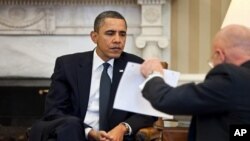President Obama returned to the White House after a brief trip to Pennsylvania on Thursday, and has been holding more consultations advisers on the situation in Egypt. The United States pressed harder on the Egyptian government and military to stop a wave of violence.
The president moved quickly past members of the press corps without comment, and into the Oval Office where over the past few days of the Egyptian crisis he has met with advisers and spoken twice by telephone with President Hosni Mubarak.
In an interview with ABC's Christiane Amanpour, Mr. Mubarak referred to those conversations and said, according to excerpts, while he is a "very good man" Mr. Obama didn't understand the culture of Egypt.
In the same interview, Mr. Mubarak said he was "very unhappy" with violence in Egypt, which he blamed on the Muslim Brotherhood, but said he could not step down and risk the chaos he says would ensue.
President Obama's only public remark on Egypt came much earlier in the day, in a speech to the National Prayer Breakfast.
"We are also mindful of the violence we are now seeing in the Middle East and we pray that the violence in Egypt will end and that the rights and aspirations of the Egyptian people will be realized and a better day will dawn over Egypt and throughout the world," he said.
There were no indications President Obama would make any additional remarks on Egypt, as the United States stepped up pressure on the government in Cairo to prevent additional violence.
A White House statement said Vice President Joe Biden spoke by telephone with Egypt's Vice President, Omar Suleiman, to reiterate President Obama's condemnation of recent violence. Mr. Biden also called for restraint by all sides and urged that credible, inclusive negotiations begin immediately for a transition to a democratic government.
Vice President Suleiman told ABC on Thursday that the government would never authorize the use of force against the Egyptian people, saying they had legitimate grievances, which he and President Mubarak asserted the government had met.
Earlier, White House Press Secretary Robert Gibbs issued a strong condemnation of violence in Egypt, and called systematic targeting of journalists completely and totally unacceptable.
The veteran U.S. diplomat, retired Ambassador Frank Wisner, returned to Washington early on Thursday from Cairo where he conveyed key messages from the U.S. government to President Mubarak and other officials.
The State Department said Wisner had briefed Secretary of State Hillary Clinton, but it was unclear whether he would also brief the president.
Secretary Clinton said the U.S condemns attacks on journalists, saying the Egyptian government and army have a clear responsibility to protect those threatened and hold accountable those responsible for attacks on the media.
She also urged the beginning of serious negotiations between the Egyptian government and a broad and credible representation of Egypt's opposition, civil society and political factions.
The White House provided details late Thursday of a conversation President Obama had with President Ali Abdullah Saleh of Yemen, where largely peaceful demonstrations occurred between pro and anti-government factions.
According to the statement, Mr. Obama welcomed "significant reform measures" and stressed the need for President Saleh "to follow-up his pledge with concrete actions." Mr. Obama also said Yemeni security forces should show restraint and refrain from violence against demonstrators.
President Obama also used the call to tell President Saleh it is "imperative" that Yemen take forceful action against Al Qaida in the Arabian Peninsula (AQAP), and expressed concern over the release of Abd-Ilah al-Shai, who had been sentenced to five years in prison for his association with AQAP.
Obama Continues to Monitor Tense Egypt Situation
- By Dan Robinson





